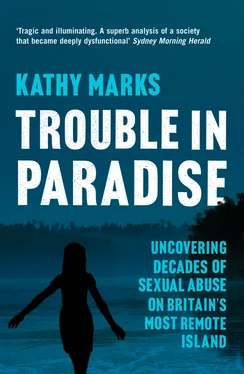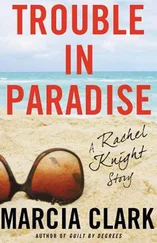1 ...6 7 8 10 11 12 ...20 But logistics were not the only issue. Pitcairn was tiny and remote, with no resources worth exploiting, and—unlike, say, the Falkland Islands in the South Atlantic—it was of no strategic importance. When responsibility for the island was transferred from Fiji to New Zealand in 1970, the British Foreign Office reassured the High Commissioner to Wellington, who would now be supervising the colony, that ‘the duties of the Governor of Pitcairn are not onerous’.
If recent governors heard that statement, they would sigh. In the past, their role as the Queen’s representative on Pitcairn was mainly ceremonial, although they did have the power to pass laws and override the local council. But since allegations of widespread sexual offending came to light, the island has taken up an inordinate amount of their time.
While the scandal broke in 2000, the first hint of it actually came in 1996, with an incident that not only foreshadowed what was to follow, but set off a chain of events that led inexorably to Operation Unique, and the women of Pitcairn breaking their silence. An 11-year-old Australian girl living on the island with her family—let us call her Caroline * —accused Shawn Christian, Steve’s youngest son, of rape. Her father reported it to the Foreign Office, and Kent Police, based in southeast England, offered to investigate.
Dennis McGookin, a freshly promoted detective superintendent and genial ex-rugby player, was given the case. Accompanied by Peter George, an astute detective sergeant, he flew to Auckland in September 1996, where the pair met Leon Salt, the Pitcairn Commissioner, and the British official in charge of servicing the practical needs of the remote territory. (Among other things, the Commissioner organises the delivery of supplies.) The three men travelled to Pitcairn on a container ship, the America Star ; arriving in a big swell, they descended the ship’s wildly swinging Jacob’s ladder into the waiting longboat.
Despite Pitcairn having been a British possession for 160 years, McGookin and George were the first British police to set foot there. They were nervous about their reception; yet the islanders, including 20-year-old Shawn, could not have been friendlier. Shawn readily admitted to having sex with Caroline, saying that it had been consensual. He showed them love letters from her, and even escorted them to the sites of their encounters, which included the church.
Caroline’s family had already left the island. She had been questioned by police in New Zealand, and was said to be very tall for her age, physically mature and ‘quite streetwise’. She had made the rape allegation after her parents caught her coming home late. Despite her age, the detectives decided just to caution Shawn for under-age sex.
The inquiry was over in a day, but the Englishmen had to wait to be picked up by a chartered yacht from Tahiti. They resolved to spend their time addressing the issue of law enforcement.
Pitcairn had never had independent policing. The island, theoretically, policed itself. The Wellington-based British Governor appointed a police officer, and the locals elected a magistrate, who was the political leader as well as handling court cases. Until Dennis McGookin and Peter George appeared, the only law was another islander.
The police officer in 1996 was Meralda Warren, a sparky, extrovert woman in her mid-30s. (Meralda was one of the vocal participants at the Big Fence meeting.) While she was bright, Meralda had no qualifications for the position, nor had she received any training. ‘Everyone on the island had a job, and that just happened to be hers,’ says McGookin. Meralda was also related to nearly everyone in the community. If a crime was committed, she might have to arrest her father, or her brother, or one of her many cousins.
History indicated, though, that she was unlikely to find herself in that delicate situation. Her predecessor, Ron Christian, who had been the police officer for five years, had never made a single arrest. Neither had the two previous incumbents, of seven and 21 years’ service respectively. No one had been arrested since the 1950s. The Pitcairners, it seemed, were extraordinarily law-abiding. All Meralda did was issue driving licences and stamp visitors’ passports. To be fair, that was all her predecessors had done.
The magistrate in 1996 was Meralda’s elder brother, Jay, later to go on trial himself. Jay, who was on the longboat when we arrived, had occupied the post for six years. Like Meralda, he had no qualifications or training, and was related to nearly everyone on the island. That could have been tricky, but fortunately for Jay, not a single court case had taken place during his time in office. And previous magistrates had been similarly blessed. The Adamstown court had not sat for nearly three decades.
Not that the locals would have feared the prospect of jail. The size of a garden shed and riddled with termites, the prison—a white wooden building—had never held a criminal. Lifejackets and building materials were stored in its three cells.
The British detectives were unimpressed with Meralda and Jay. According to Peter George, whom I interviewed in the Kent Police canteen in Maidstone in 2005, ‘It was glaringly obvious, bluntly speaking, that their standard of policing was not really adequate.’
When the police left Pitcairn at the end of their ten-day stay, the islanders, including Shawn Christian, waved them off at the jetty. Soon afterwards, the Governor, Robert Alston, wrote a letter to the Chief Constable of Kent Police, David Phillips. Thanks to McGookin and George, he said, the matter—which ‘had the potential to turn into a long, drawn-out and complicated legal case’—had been satisfactorily resolved. Alston added that the visit had ‘had a salutary effect on the islanders and one which will remain with them for a long time’. As a token of gratitude, he sent Phillips a Pitcairn coat of arms, to be displayed at Kent Police headquarters.
Dennis McGookin was not so convinced about the salutary effect. Back in London, he informed the Foreign Office that the island needed to be properly policed. Britain was not prepared to fund a full-time police officer for a community of a few dozen people. Instead, it decided to recruit a community constable to travel to Pitcairn periodically and train the local officer.
In 1997 Gail Cox, who had been with Kent Police for 17 years, was selected for the job. Cox was easygoing and gregarious; she had worked in the traffic section, in schools liaison and on general patrol duties. The Daily Telegraph newspaper, which interviewed her before she left, reported that she was ‘a practised hand at dealing with pub brawls and squabbles between neighbours’, and ‘highly regarded for her ability to defuse situations before they turn nasty’. Cox told the paper that ‘if the line needs to be drawn, it will be drawn, and I am not frightened to draw it’. Those words were to prove prophetic.
Leon Salt, the Auckland-based Commissioner, accompanied Gail Cox to the island and introduced her to the locals. ‘I put on this jokey persona, and they seemed to like that,’ she told me when I met her in Auckland in 2006. ‘They were very accepting of me. I became part of the community.’
Cox spent 12 weeks on Pitcairn, and established a good rapport with the islanders—perhaps too good. ‘A lot of people are romanced by the place, and I fell for it,’ she says. ‘I saw the community through rose-coloured glasses. I thought it was this really idyllic place, and everybody was really nice.’
The Englishwoman was not scheduled to go back to the island until 1999. Between her visits, Pitcairn underwent some changes. A new Deputy Governor, Karen Wolstenholme, was appointed. Wolstenholme took more interest in the place than some previous incumbents, and visited soon after taking up her post. Another fresh face was Sheils Carnihan, a forthright Scot brought up in New Zealand, who started teaching at the school in early 1998.
Читать дальше












